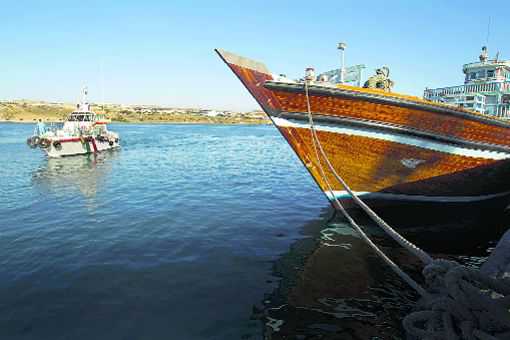
Advantage India: Of all the countries, India has prepared for an era of relative peace by starting work on linking Afghanistan with the Chabahar port.
Sandeep Dikshit
Deputy editor
The latest round of US sanctions has given world powers like India an additional headache about sourcing their military and oil requirements from Iran and Russia. But there is a silver lining for India as it reworks its calculations. A US exemption to India for a communications artery into the Afghan Pushtun heartland can make New Delhi an unavoidable component of all future deliberations on Afghanistan. In other words, India can soon be back in Afghanistan.
The US law, known by its abbreviation CAATSA, is meant to ‘reform’ North Korea, Russia and Iran by imposing sanctions on their strategic sectors. The US has now allowed India and half a dozen other countries to gradually taper their dependence on Iranian oil instead of abruptly shutting off the tap that will spike global crude prices. But there was another Iran-specific exemption by the US and meant only for India. This was for a road-cum-rail project India has been slowly assembling from the Iranian port of Chabahar into Afghanistan.
The link reduces Pakistan’s strategic importance as Afghanistan’s only access to the sea. More important from geopolitical terms, the Indian link will be the more-efficient rail-based, making the evacuation of minerals from Afghanistan by this route cheaper than by the road route to Pakistani ports.
One reason why this project never caught momentum was the American policy of punishing countries and companies that traded with Iran. This scared off many Indian private companies that were eager to manage berths at Chabahar. Many companies keen to set up factory complexes based on Iranian gas and Afghan minerals around Chabahar also cried off after the Bush administration imposed sanctions on Iran. They haven’t been back since, leaving the projects in the hand of public sector companies with their inevitable lack of initiative.
There is much excitement among strategic circles over the Moscow conference on Afghanistan that was attended by the Taliban. Right from the Bonn conference of 2001, these meets have been hyped up to ‘open a new page’ in Afghanistan’s history. But the situation on the battlefield for the past 10 years has been of a stalemate with a slight edge for the Taliban. In terms of ending the conflict, such conferences will not mean anything because neither side can force the other to the negotiating table in a position of inferiority. Both believe superiority over the other is a matter of the next military battle.
The external backers of both sides are happy to keep stoking the fires but the interminable Afghan-on-Afghan civil war is wearing down the locals. This was reflected when 30,000 Taliban militants entered government-held cities across the country during the three-day Eid ceasefire in mid-June and held joint celebrations with Afghan National Security Forces. Some fighters were even reported to have taken a break from the Taliban’s annual offensive to meet their rivals off the battlefield.
The military stalemate and desire for peace among Afghans may be forcing a rethink in both Pakistan and the Taliban. The re-entry of the Americans into combat operations from 2016 has made it harder for the Taliban to completely seize provincial capitals as its firepower is inadequate to deal with US armoured vehicles, leading to repeated routs in the contest for flat ground around the cities.
With neither side poised to be the ascendant power in Afghanistan, the meets such as the one in Moscow are more about the modalities of holding talks though there is a sense of urgency because of the new player on the Afghan terror block — the Islamic State (IS). The Taliban is inward looking, focusing on Afghanistan and may be chastened after learning its lessons from hosting a terror exporter like Osama bin Laden.
The end-goal of the IS, on the other hand, is the establishment of a worldwide Islamic caliphate, which means that it will not be disinclined to train budding violent Islamists of other countries, including India, Central Asia and Russia. Having suffered a split with the Central Asian component of the IS forming a separate bloc, a brief window has opened up for talks with the Taliban, an option better than permitting an improvement in IS-Taliban relations. Already security experts are talking about a helping hand from a Taliban ally to the IS for staging a recent series of attacks in Kabul.
While over a dozen countries with fingers in the Afghan pie try to reduce the intensity of conflict, PM Narendra Modi’s conversation with US President Donald Trump, as reported by US journalist Bob Woodward in his book, Fear: Trump in the White House, needs to be recalled. ‘He (Modi) told me the US has gotten nothing out of Afghanistan. Nothing. Afghanistan has massive mineral wealth. We don’t take it like others — like China’, Trump was reported as telling his aides.
Trump is absolutely on the ball. The US has been the sucker but India’s communication project is the sole takeaway in Afghanistan that will widen the arc of beneficiaries when Central Asians, ever keen to wriggle out of the Sino-Russian embrace, also connect to this link.
This is a unique situation for India. Even Iran doesn’t look askance at the US benevolence in this case because the Indian footprint on its territory helps develop its neglected Sistan Baluchestan, for long in the grip of insurgency and drug running because of backwardness. The assurance that this project will not be blackballed by the US should be just the signal for India to go all out to make up for the years of hesitation.



























